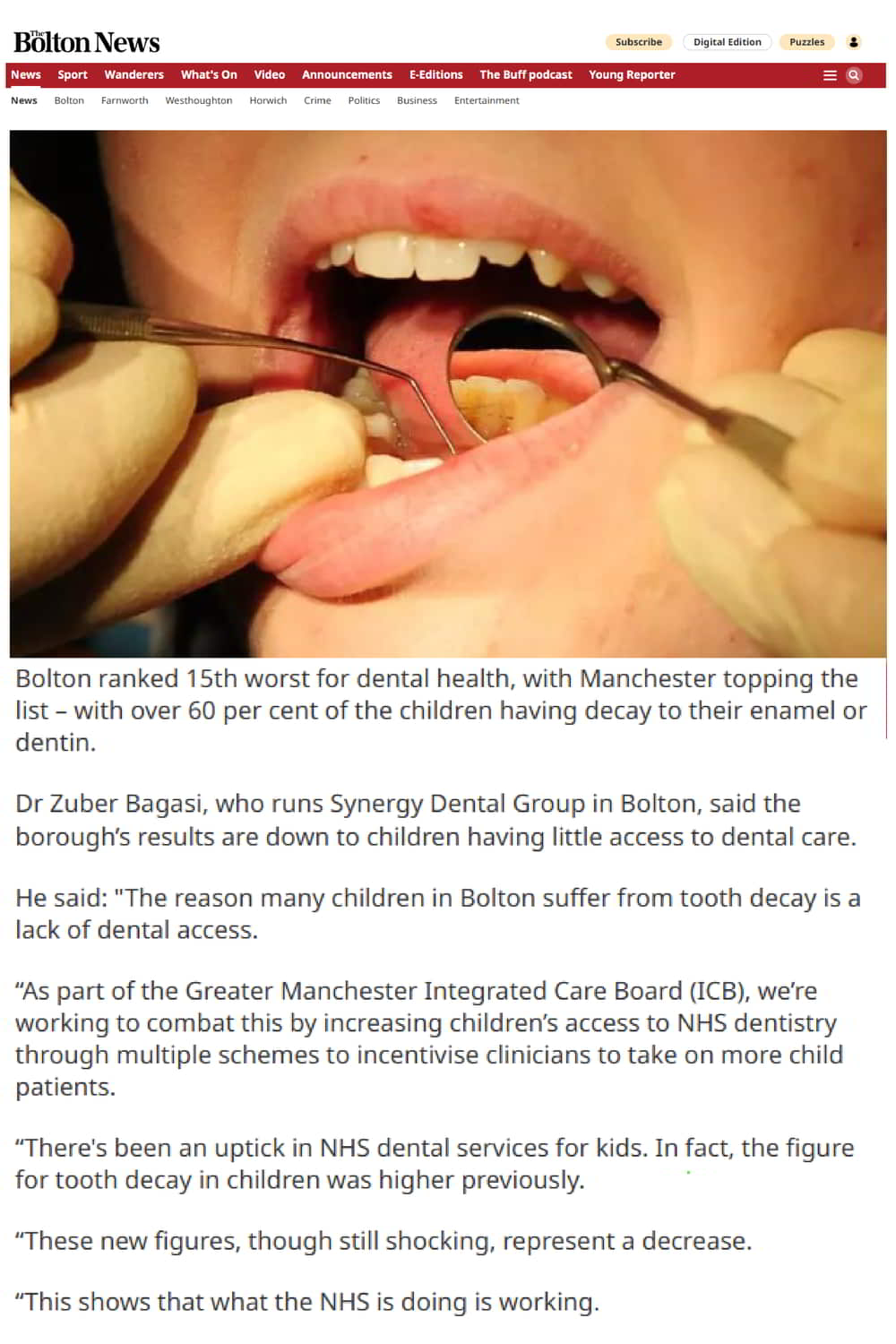Nearly half of Bolton’s children have tooth decay and more serious dental problems by the age of five – placing it in the bottom 20 regions for young people’s tooth health in the country.
And an Bolton MP has called the figures “deeply concerning”.
The National Dental Epidemiology Programme examined the teeth of 341 of Bolton’s 3,949 five-years-olds in the last school year.
Of the children analysed, nearly 44 per cent (43.7 per cent) had enamel decay or worse – more serious decay to the dentin layer under it.
And nearly a third (33.1 per cent) had one or more teeth with dentin decay that had gone “obviously” untreated.
The survey covered children attending mainstream, state-funded schools across the country.
Over 81,000 five-year-olds were examined across the country, but the North West showed the highest level of dental problems with 36.8 per cent of children having decayed teeth.
Bolton ranked 15th worst for dental health, with Manchester topping the list – with over 60 per cent of the children having decay to their enamel or dentin.
Dr Zuber Bagasi, who runs Synergy Dental Group in Bolton, said the borough’s results are down to children having little access to dental care.
He said: “The reason many children in Bolton suffer from tooth decay is a lack of dental access.
“As part of the Greater Manchester Integrated Care Board (ICB), we’re working to combat this by increasing children’s access to NHS dentistry through multiple schemes to incentivise clinicians to take on more child patients.
“There’s been an uptick in NHS dental services for kids. In fact, the figure for tooth decay in children was higher previously.
“These new figures, though still shocking, represent a decrease.
“This shows that what the NHS is doing is working.
“But, as a parent of young children I think the idea of any child suffering with tooth decay is one too many.
“I’ve been using my position as a dentist and as the CEO of Synergy Dental Group to lobby MPs and tackle this issue.
“I was born and raised in Bolton, so I always want to improve things for the people here.”
Tooth decay rates in Bolton reduced from last year by more than nine per cent. And across the country, by seven per cent.
In the UK, children in the most deprived areas were still more than twice as likely to have dentin decay (32.2%) as those living in the least deprived areas (13.6%).
There were also disparities by ethnic group.
Asian young people had the highest rate of tooth decay of all ethnicities at 37 per cent, apart from those in the “Other” ethnic group whose rate was just under half (45.4 per cent).
Yasmin Qureshi MP, who represents Bolton South and Walkden, said: “These figures are deeply concerning, especially as tooth decay remains the leading cause of hospital admission for five- to nine-year-olds in this country.
“No parent should have to watch their child suffer in pain, particularly when so much of it could be prevented.
“But this is the challenge we face in dentistry after 14 years of Tory incompetence and negligence.
“Lord Darzi’s review laid bare the scale of the crisis in our health service, including NHS dentistry.
“Even he, with all his years of experience, was shocked by what he discovered.
“His report provided the honest assessment needed to tackle these issues head-on.
“Rescuing NHS dentistry will not happen overnight, but from my conversations with Ministers, it’s clear the government knows it cannot afford to wait.
“That’s why they’re working around the clock to end the appalling tooth decay that continues to blight our children.
“Working with local authorities and the NHS to introduce supervised tooth brushing for three- to five-year-olds in the most deprived communities, helping them develop healthy habits for life and protecting their teeth from decay. To have the greatest impact, these programmes must be targeted at the most disadvantaged children.
“As Chair of the APPG on Dentistry, I have been raising these issues for years, pushing for urgent investment in NHS dental services and a real commitment to tackling child poverty – because no child should suffer from entirely preventable dental disease”.
A spokesperson for NHS Greater Manchester and Bolton NHS Foundation Trust said: “Oral health amongst children in Bolton and across Greater Manchester is a priority for both NHS Greater Manchester and Bolton NHS Foundation Trust.
“That’s why it’s really encouraging that the proportion of 5-year-old schoolchildren in Bolton who participated in this survey with enamel and/or any dentinal decay has reduced from 52.5 per cent in 2022 to 43.7 per cent in 2024.
“We know that there is more to be done as poor oral health has an impact on children and their families.
“It can affect a child’s ability to eat, sleep and take part in normal activities with time of school and work for parents to bring children to the dentist for treatment.
“Dental decay is largely a preventable disease, and we have worked hard with partners across our system to improve the oral health of our children.
“Our priority now is to keep working together to build on what we have already achieved through the initiatives we have in place to improve oral health.
“This includes the introduction of the Greater Manchester Oral Health Improvement Programme and the distribution of toothbrushing packs to children.
“The Trust’s Healthy Families Team is currently also delivering a supervised tooth brushing programme to over six thousand children in Bolton’s schools and nurseries – focusing on areas with the greatest need.”

